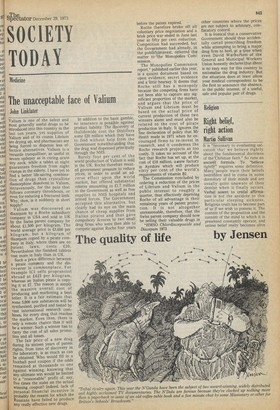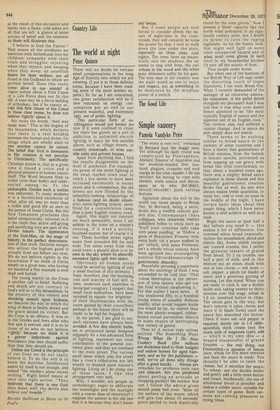Religion
Right belief, right action
Martin Sullivan
It is "necessary to everlasting salvation that we believe rightly about the fundamental doctrines of thethristian faith." So runs an ancietilt formula. To "believe rightltr requires some definition. Many/people leave their beliefs bedridden and in coma in some dormitory of their minds and are usually quite unaware of their demise when it finally occurs. Verbal assent to credal affirmation is not the antidote to this particular sleeping sickness. Religious truth has to become part of us if we wish to possess it. The content of the proposition and the content of the mind to which it is presented constantly operate, and unless belief really becomes alive
as the result of this encounter and bursts into a flame, cold ashes are all that are left. A glance at some articles of belief and the response to them will illustrate this.
"I believe in God the Father." That means all the attributes we associate with fatherhood; love for children; sympathy with their trials and struggles; rejoicing when they rejoice; and weeping when they weep; an unselfish desire for their welfare, are all • found in the Godhead in whom we profess belief. Does this really • come alive in our minds? A vague notion about a First Cause or a Life Force does not fit this bill. A man may be a fierce bulldog of orthodoxy, but if he cannot ac cept this first clause of the Creed in these clear terms, he does not believe 'rightly' about it.
We recite the words, "And was made man." This is the dogma of the Incarnation, which declares that there is a real kinship between the human and divine, for things which are' wholly alien to one another cannot be united. The belief that God is immanent in His creation is not peculiar to Christianity. The specifically Christian notion is, that at a given time it found a voice and a physical presence in human nature itself. The Word became flesh (a richer term than body) and taber nacled among us. To the philosophic Greeks such a notion was abhorrent. To many moderns it is a far-fetched extension of what, after all, was no more than a noble and good life as seen in the person of Jesus Christ. But the New Testament proclaims this belief unequivocally. Inherent in it is the claim that active self-giving and sacrificing love are part of the Divine nature. The appearance
of the God-Man, on the stage of history, is the perfect demonstration of that truth. Doctrine merges into action; the highest good is.
actually lived out before our eyes. We do not believe rightly in the Incarnation if we think of Christ simply as a good man, who having set mankind a fine example is now dead and buried.
The young martyr on the Cross is another call to belief. Suffering and death are not contrary to God's will or to His blessedness. In the mystery of this violent and shocking assault upon holiness, we discover the way in 'which the sting of death is finally drawn and the grave denied its victory. But the Cross is an offence. It was so to the Greeks and Jews alike who first saw it erected, and it is so to those of us who do not believe 'rightly' because we think it is a graver indictment against Providence that men should suffer than that they should sin.
Unless our Creed is the principle of our lives we do not really believe it. To do the will is to know the doctrine. Intellectual assent by itself is not enough, and indeed "the intellect alone moves nothing." Right belief issues at , once into right action. "Thou believest that there is one God: thou doest well: the devils also believe and tremble."



























 Previous page
Previous page